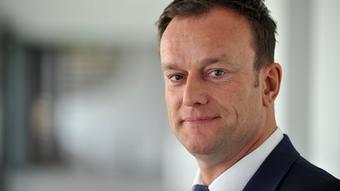EUROPEAN UNION
2014 from Brussels: Changing security policy and challenges for NATO
2014 was marked by Russia's aggression toward Ukraine, and EU and NATO attempts to find a response to it. One thing is clear: the conflict will continue for years to come, says our Brussels correspondent Bernd Riegert.
I was surprised, indeed shocked, that this year I was obliged to dig out long mothballed terms for my report on Europe: deterrence, military build-up, invasion, annexation, war. Twenty-five years after the end of the Cold War and the mainly peaceful political transformations in Central and Eastern Europe that followed the horrific wars in the Balkans, the idea that armies could once again face each other in Europe seemed like fiction, an idea for a novel. But that scenario has become bitter reality. Russia, with no legal basis, has singlehandedly robbed Ukraine of territory and set off a military conflict in eastern Ukraine.
In the Baltic states, Poland, and Finland, fears of a Russian invasion are real. Russia is saber-rattling on its borders with the West, carrying out maneuvers with airplanes and ships, as close as possible to NATO boundaries. This is pure provocation, a show of force. The European Union has reacted with economic sanctions and unflinching support for Ukraine, as well as Georgia and Moldova. NATO has reacted by changing its strategy: defense of its eastern borders is once again the priority, not foreign intervention. It has cost the EU a great deal of energy to act together and remain unified, and thus far it has worked. The next critical test will come this spring when sanctions against Russia may have to be extended, perhaps even tightened. NATO, under US leadership, has decided to create a new quick response force. But there is and can be no military plan for recapturing Crimea. In which case, it isn't very clever to name the new force "spearhead." That can only further irritate Russia.
New split threatens
The rhetoric on both sides of the dispute became increasingly hostile throughout the course of the year. There was talk of deterrence, Russia even broached the subject of nuclear weapons. One quickly falls back into a Cold War mentality, into the camps of good and evil. Were the 25 years that the Europeans sought to overcome partition for nothing? Why does Russian leadership still persist in thinking in the old categories of West and East? Why does Putin feel surrounded? Why do normal Russians fall for what is at times hair-raising propaganda? Why has the cold war in Ukraine become a hot one? The so-called Russia experts in Europe have explanations at the ready, but do they really understand what is going on in the minds of Putin's inner circle?
In Europe, concerns get bigger the closer a country is to Russia. In Spain and Italy, Russia seems far away. But so far, through the course of several summits, heads of state have been successful in meeting the challenge of keeping the EU political store together. Democracy and diplomacy have been stronger than Putin's aggression. How long will Europe be able to keep it up?
Serious security crisis in Europe
In late January, the Russian president was a guest at the EU-Russia summit in Brussels. Partnership was discussed one last time. I observed the press conference just a few meters away from Putin. He seemed strangely disinterested and at the same time confident. At the moment I had no idea what would transpire in Ukraine. Did Putin already have a plan?
And how long can Russia keep holding on? EU and US economic sanctions are showing their effects, and oil prices on the global market are sinking. The ruble is in free fall. The Soviet Union imploded because of its economic inferiority. Does the same fate await Russia? Many strategic minds in Europe are betting on it. All that is clear is that the conflict will go on for years. Of course the primary victims are the people of eastern Ukraine, but we have had to sacrifice our sense of security too. Military options must once again be pondered in Europe.
By coincidence, the crisis in Ukraine is escalating exactly 100 years after the start of World War I, or the great catastrophe as it was called at numerous commemorations that took place around Belgium. After the many horrific experiences of the previous century, peace can never be taken for granted in Europe. Speakers reminded us of that fact at the vast military cemeteries of Liège and Nieuwpoort. Diplomacy must maintain the upper hand. That is the lesson of the First World War. The current crisis must be resolved peacefully. That too, is what the year 2014 represents. dw de



No comments:
Post a Comment